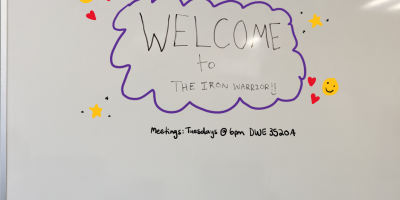Have you ever had a book or comic that you really enjoyed, wished for years that there would be a movie adaptation, then regretted that wish the moment you actually saw the movie? I’m sure I’m not the only one who feels like a lot of movie adaptations fail to capture the spirit of the original work, so that’s what I’m going to be talking about for this letter from the editor.
The first example that popped into my head was the Hitchhiker’s Guide to the Galaxy, which actually has one of the most convoluted development arcs of any fictional work. If anyone has ever seen the 1981 BBC TV show, you would probably be amazed at how perfectly it adapted the original two books, with dialogue almost word for word, and the pacing the exact same (just ignore the horrible effects). The books were actually based off of a BBC radio drama written by Douglas Adams, and broadcast in 1978, then the TV show followed after that.
In 2005, a big screen adaptation was made, featuring a couple of cameo’s of actors from the show. One of my favourite things about the movie is the casting of Alan Rickman as Marvin, the Paranoid Android. Some people don’t like the movie as it seemed to take inspiration from the first book, but didn’t really follow the plot line or even centre around the same goals; characters and alien species which received passing reference in the book became the central antagonists of the movie. As a stand-alone movie, the H2G2 is a good movie that has the same manic “make it up as you go along” style as the books, as it should considering Douglas Adams, the author of the books, co-wrote the screenplay. But as an adaptation of the book, it definitely falls short. Back to the story of the books for a minute. Following the completion of the trilogy with the third book, ‘Life, the Universe, and Everything’ Adams then continued the ‘trilogy’ with another two books. Before completing the sixth book in the trilogy (yes, he still referred to it as a trilogy) he died. Recently the book has been completed based on his notes, by the author of the Lemony Snicket books. I still haven’t read this book as I am a little apprehensive of the new author.
This links into my next point nicely, though I’ll explain that in a minute (ooooh, suspense). Most people have heard of the Jason Bourne movies, starring Matt Damon. This series of movies is loosely based on the Bourne Trilogy by Robert Ludlum. I say loosely because they movie basically used the name and some of the locations, but that’s about it. Here’s a quick comparison – Spoilers.
Book Series:
Jason Bourne wakes up from severe injuries with amnesia, not knowing who he is or where he comes from, but with some garbled memories of assassinations and covert government training. Following clues he travels to Europe to find out who he is, there he meets a brilliant French-Canadian, government economist named Marie St. Jacques. Jason drags her along as he is being chased by an assassin named Carlos. Over the course of the book Jason eventually finds out that he is not an assassin, but a government trained soldier who was supposed to pose as an assassin to lure out the Jackel. In the end he almost manages to capture the Jackel, but he escapes. Jason and Marie get married and Jason begins to start a new life after recovering a part of his memories – including his real name, David Webb.
The second book (Bourne Supremacy) has Marie, get kidnapped and David/Jason having to jump back into the world of espionage to rescue her. In the third book (Bourne Ultimatum) Carlos returns to seek revenge on Bourne, by attempting to kill his wife and children. A globe-trotting adventure ensues, with Bourne eventually killing Carlos and finally being able to abandon the life of Jason Bourne and live out his life with his family.
Now, the movies:
Basically Jason Bourne IS an assassin, but a rogue assassin of the US government. After failing to complete a mission and being severely injured, Bourne is left with amnesia and goes to Europe to find out who he is. There he meets a german con-artist named Marie Kurtz, who he drags along for the adventure. Bourne kills everyone who comes after him until he hunts down the person who trained him and kills him too. Then he and the woman go into hiding in the tropics.
In the second movie Marie is shot and killed by US agents, Bourne goes on a rampage and kills them all.
In the third movie Jason is attacked by US agents, he goes on a rampage and kills them all, ending with him finding out that his real name is David Webb.
As you can see the movies abandoned the entire Carlos storyline, then killed Marie, so the second and third movies then had entirely new story lines, just borrowing the names from the books.
This kind of thing really bugs me, because the creators of the movies didn’t even care about the original story. Instead, they wanted to tell their own story and this novel series already had a lot of fans – so why not capitalize on that to gain an initial audience?
I recently learned that there was actually a made-for-TV movie adaptation of the original book produced in 1988. Apparently this version was much more true to the book, but ends the Carlos storyline within the movie rather than leaving it open to adapt the other two books. Needless to say I have ordered this movie and am looking forward to seeing a better adaptation of one of my favourite books.
Here’s where that link to the H2G2 series comes in, as the Bourne series actually continued after the death of Robert Ludlum and his original three books. Ignoring the fact that the trilogy ended leaving no loose ends, there are a further six books in the series written by another author, Eric Van Lustbader.
I have not read any of these books, mainly because they don’t really have anything to do with the originals, weren’t based on anything from Robert Ludlum, and relied mostly on gimmicks like the “His long, lost son is back, and is actually an assassin”.
The next book I’m going to talk about isn’t actually a book, but one of the greatest graphic novels of all time – The Watchman. I thought this movie was actually a great adaptation, despite some changes to the ending. The movie had a ton of scenes that were almost direct translations from the comic. I think comics have a benefit over books because there is already a visual that fans have latched onto. You dare to change the the costume of a character or a memorable scene, and the fans will never let you hear the end of it. One of the main complaints people had with the movie was that the ending was different from the comic, and the villain was kind of obvious from the beginning.
My last example is the Harry Potter series, which has come to an end this year with Deathly Hallows Part 2. I have seen all of the movies in theatres, after reading each of the books when it was published. My favourite movies were numbers one, two, three, and five, all of which were good adaptations of the books, I’ll admit that they had to cut many scenes, but they did a great job of getting across all of the plot points in the time allotted.
Films four, and six are the biggest disappointments for me, as they cut out significant scenes and didn’t bother to use the time they had to tell as much as they could, instead they fabricated new, pointless scenes that didn’t advance the story or serve any real purpose (Example: the attack at the Burrow in Half-Blood Prince).
I’m always apprehensive of book adaptations, but I always have that hope inside that a director will actually like the book they are adapting and do an actual adaptation, following the plot, honouring the characters, and bringing the original creator’s vision to the big screen.




Leave a Reply